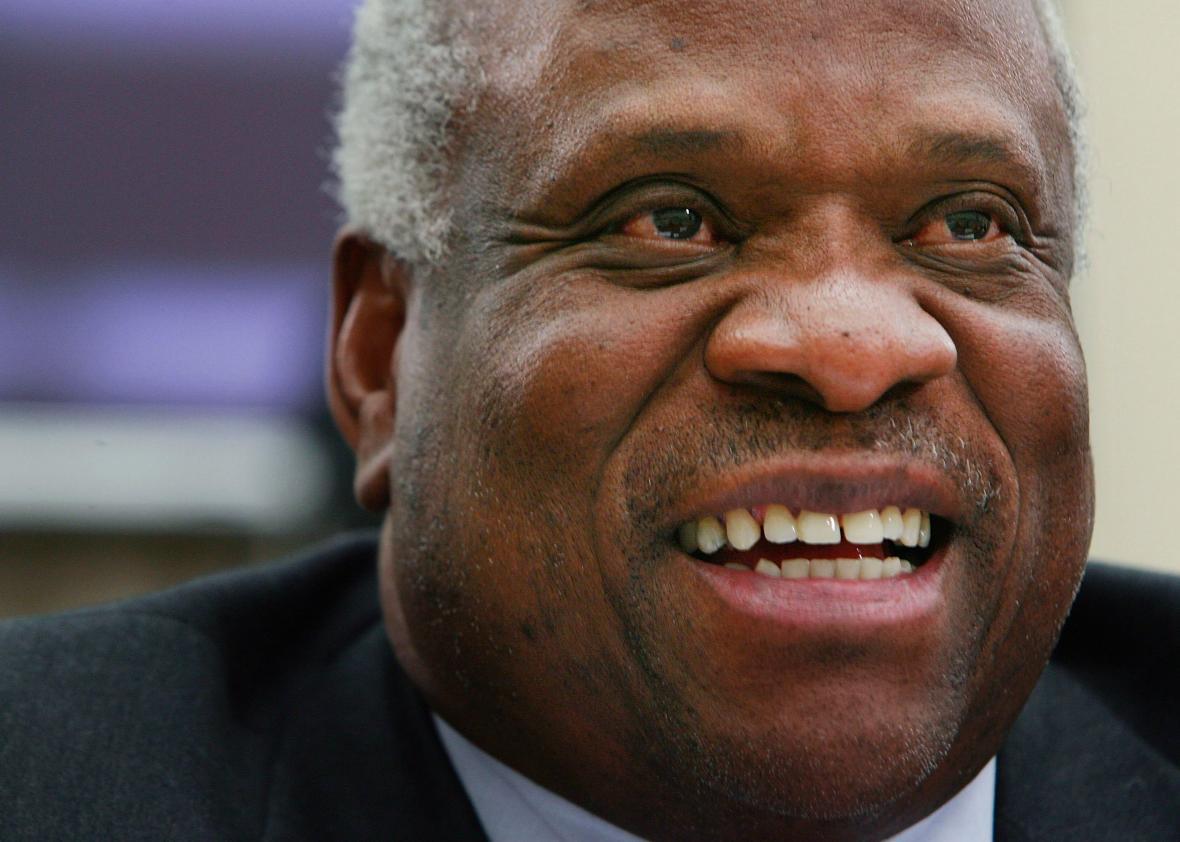Of the four dissents filed in Obergefell v. Hodges, the Supreme Court’s recent same-sex marriage decision, Justice Clarence Thomas’ drew a special kind of ire from left-leaning writers. One paragraph in particular has been quoted, with astonishment, over and over again. The majority, Thomas wrote, “goes to great lengths to assert that its decision will advance the ‘dignity’ of same-sex couples.” But human dignity, he continued:
has long been understood in this country to be innate. … Slaves did not lose their dignity (any more than they lost their humanity) because the government allowed them to be enslaved. Those held in internment camps did not lose their dignity because the government confined them. And those denied governmental benefits certainly do not lose their dignity because the government denies them those benefits. The government cannot bestow dignity, and it cannot take it away.
Here at Slate, Alison Griswold called the passage “brutal.” Jamil Smith of the New Republic called Thomas’ definition of dignity “disgraceful” and decried the dissent as “pernicious” and “unsympathetic.” Lev Raphael, a blogger at the Huffington Post, said that the offending passage was “extraordinarily illogical and ahistorical” and that Thomas sounded “like a profoundly cruel man utterly lacking in empathy.” The Japanese American Citizens League was “appalled” by the reference to internment camps.
Some of the criticism was linked to Thomas’ racial identity. Smith saw the dignity argument as an extension of the justice’s “self mythology,” his “legendary story” of individual perseverance against racism. Actor George Takei, writing on MSNBC’s website, expressed surprise that Thomas, “as an African American,” would oppose marriage equality. In a follow-up interview to that piece, he called Thomas “a clown in blackface.” (He later apologized. Conservatives were gleeful.)
Thomas is a frustrating figure, but the attacks were unnecessary. There’s nothing unusual or nasty about his dignity argument. If anything, it’s a statement of the obvious. And here’s the kicker: It doesn’t respond to the content of Kennedy’s written opinion.
We use the word dignity in multiple ways. Sometimes we use it to refer to a kind of bearing or nobility, a type of self-respect. A person can indeed lose that kind of dignity. But at other times we’re talking about an innate quality—a person’s worthiness to be treated well. That kind of dignity cannot be lost, but it can be fulfilled to varying degrees. And it manifests itself in the other kind of dignity—the bearing, the nobility, the self-respect.
The two meanings often overlap. Think of James Baldwin writing to his nephew in 1962: “[Y]ou come from sturdy peasant stock, men who picked cotton, dammed rivers, built railroads, and in the teeth of the most terrifying odds, achieved an unassailable and monumental dignity.” Does Baldwin mean to suggest that some people have dignity that is assailable? Of course not. He just means that the men he’s talking about manifested their innate dignity in an especially impressive and undeniable form.
Clarence Thomas is clearly and explicitly talking about dignity in the second, “innate” sense in his dissent. He believes, he says, in “a vision of mankind in which all humans are created in the image of God and therefore of inherent worth.” He might as well be quoting from the Catholic catechism, the handbook of his religion, which says, “The dignity of the human person is rooted in his creation in the image and likeness of God.” In this framing, slavery was not atrocious because it deprived slaves of dignity; it was atrocious because it presumed they had none.
Again, there’s nothing extraordinary or unusual about this argument. There’s no need to eviscerate Thomas for it, and there’s no need to go rooting around in his past for additional context. (Jeet Heer did just that, insightfully, in the New Republic—but it wasn’t necessary.) We all agree that human beings are worthy of being treated with respect. Our meaningful disagreements are about what constitutes respect, about the rights and responsibilities that follow from having dignity.
Where does Kennedy stand in all this? No one seems to have stopped to ask whether he actually made the argument Thomas was attacking: that the decision would “advance the ‘dignity’ of same-sex couples.” Did he? Yes, sort of, but no, not really. During oral arguments, Kennedy indeed spoke explicitly of “bestowing” and even “enhancing” dignity (but not of “advancing” it). He probably shouldn’t have— “enhancing” dignity does not make much sense. But he also spoke of “fulfilling,” “demeaning,” and “recognizing” dignity—all of which presume that the dignity in question is already present. That’s the language he chose to use, exclusively, in his written opinion, which is all about discovering dignity in new places, finding new “dimensions” of freedom.
It’s also important to note that dignity, for Kennedy, is tied to “self-definition” and “autonomy.” We honor a person’s inherent dignity by expanding their avenues for “self-definition.” Marriage is one of those avenues, and it ought to be available to everyone, according to Kennedy. This is the point in the argument at which Thomas could meaningfully disagree.
I wish the critics had stopped to consider whether Kennedy had made the assertion they defended so vehemently. Instead of defending Kennedy, they defended the nonsensical argument Thomas had attributed to him. In the process, they created the illusion that Kennedy had stipulated a “right to dignity.” By no means is it clear that he did.
Read more of Slate’s coverage of same-sex marriage at the Supreme Court.
Want to hang out with Outward? If you’ll be in or near New York City on Monday, July 13, join June Thomas, J. Bryan Lowder, and Mark Joseph Stern—and special guests Ted Allen, of Queer Eye and Chopped fame, and marriage-equality campaigner extraordinaire Evan Wolfson—for a queer kiki at an Outward LIVE show, hosted by City Winery. Details and tickets can be found here.
